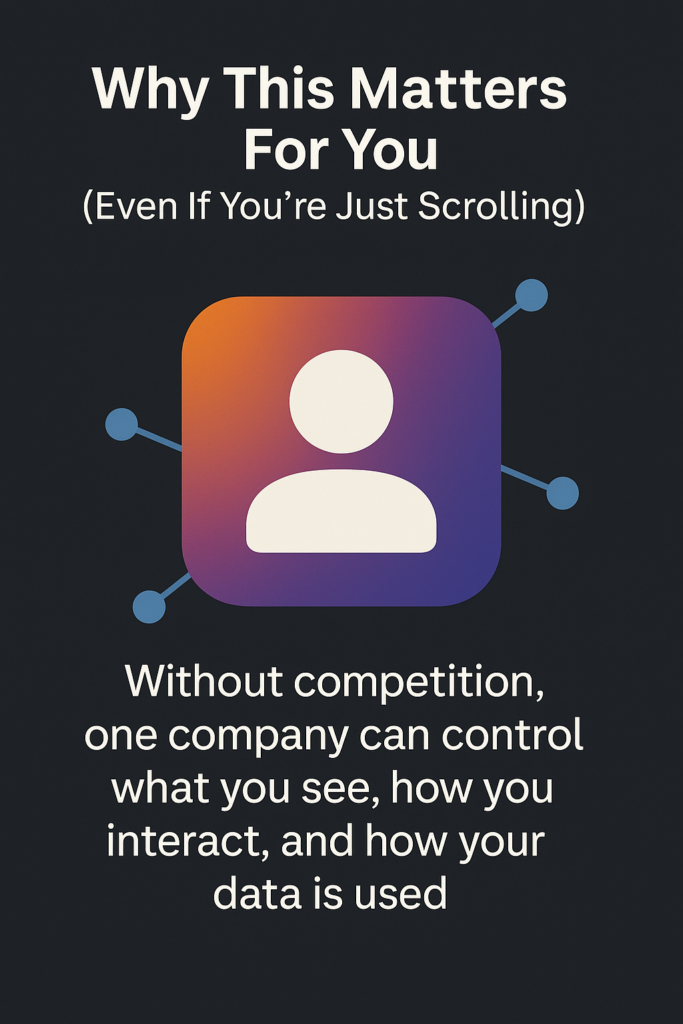
The FTC Meta Antitrust Case: Is the Social Media Giant Too Powerful?
It’s the kind of legal drama Silicon Valley dreads, and the FTC just turned up the heat.
In what could be a historic move, the FTC Meta antitrust case is challenging the very foundation of Meta’s dominance in the social media world. The Federal Trade Commission isn’t just raising eyebrows; it’s raising a lawsuit that questions whether Meta (formerly Facebook) has crossed the line from innovative to anti-competitive.
Let’s break it down. Because what’s happening here is bigger than just one company, it’s about the future of competition, consumer choice, and what it means to be a monopoly in the digital age.
Let’s take a quick look at the case
The FTC’s antitrust complaint isn’t just about ads or data. It has to do with power, more especially Meta’s control over the social media scene.
The agency argues that Meta has created an unfair monopoly by buying out potential rivals like Instagram and WhatsApp instead of competing with them. The FTC claims that these acquisitions were made in order to keep Meta’s dominance of the personal social networking market and to remove any threats.
Translation? Meta allegedly didn’t just win the social game—it bought out the competition before they had a chance to challenge it.
“Let’s just buy them”: The smoking gun?
One of the most talked-about elements of the FTC Meta antitrust case is internal communication. The complaint points to emails and memos from Meta execs—including Mark Zuckerberg—suggesting a strategy of “neutralizing competitors” by acquiring them.
Take Instagram, for example. By the time Facebook acquired it in 2012 for $1 billion, the app had already racked up over 30 million users and was skyrocketing in popularity, especially after launching on Android just days earlier.
These weren’t just savvy business deals. According to the FTC, they were deliberate moves to cut off competition at the root, protecting Meta’s dominance by absorbing any platform that could challenge it.
Let’s get to the point: What does the FTC want?
The FTC’s big move? It wants Meta to split up its empire, specifically by selling off Instagram and WhatsApp. The goal is to roll back those blockbuster acquisitions and give smaller platforms a fair shot at competing.
It’s a rare and bold request. In fact, the last time something this serious happened in tech was when the U.S. government tried to break up Microsoft in 1998, and even earlier, when AT&T was split into smaller companies in 1984.
Why now? The FTC believes Meta’s control over multiple major platforms is choking competition. If one company owns all the biggest apps, new players never get the chance to grow. By unwinding these deals, the FTC hopes to restore a healthier, more open social media market—where innovation thrives and users have real choices.
Meta’s counterpoint: “That’s not how innovation works.”
Of course, Meta isn’t taking this lying down.
Their argument? With platforms like TikTok, Snapchat, and even up-and-coming firms like BeReal or Lemon8 gaining traction, the social media landscape is more competitive than ever. According to Meta, the FTC Meta antitrust case paints an outdated picture of the market.
Plus, Meta says its acquisitions benefited users, helping build better, more secure apps and expanding features that smaller companies couldn’t have funded on their own.
Oh, and one more thing: Meta points out that the FTC originally approved these deals years ago. Why go back now?
What is this legal tightrope?
This case is tricky for a reason: it’s not just about proving Meta is big. It’s about demonstrating that Meta’s scale and strategy have actively harmed consumers by reducing choice, limiting innovation, or creating obstacles for new competitors.
Antitrust law in the U.S. traditionally focuses on price increases and consumer harm. But social media platforms don’t charge users in dollars—they charge in data and attention.
So, the FTC has to argue that Meta’s dominance has led to worse user experiences, fewer privacy options, and stagnant innovation. That’s a harder sell in court.
Why this matters for you (even if you’re just scrolling)
Okay, but why should the average Instagram user or WhatsApp chatter care?
Here’s the thing: when one company controls the lion’s share of communication platforms, it shapes what you see, how you interact, and how your data is used.
A lack of competition means fewer incentives to improve safety, transparency, or user control. This isn’t just a tech industry fight. It’s about how power works online, and whether we get a say in it.

Déjà Vu? Not quite
All of this may seem familiar, and for good reason. In recent years, Big Tech has come under more and more criticism, from Amazon’s dominance in online retail to Google’s monopoly in search.
The FTC Meta antitrust action is distinct, nevertheless, due to its scope and goals. This isn’t just about fines or slaps on the wrist. It’s about breaking up one of the most powerful tech empires in history.
And depending on how the courts rule, it could set a precedent for how the U.S. regulates Big Tech moving forward.
What happens next: monopoly or mastermind?
As of now, the case is still winding its way through the legal system. Meta has tried (unsuccessfully) to get it dismissed, and the FTC is digging in its heels.
Legal experts say it could take years for a final ruling. But even if the FTC loses, the message is loud and clear: Big Tech is no longer untouchable. Governments around the world, from the EU to India, are watching closely, ramping up their own investigations into tech monopolies.
Which brings us to the billion-dollar question: Did Meta simply outplay the competition, or did it rig the game? That’s the core tension in the FTC Meta antitrust case. One side sees Meta is viewed by some as a trailblazer who took calculated risks.
According to the other, a digital Goliath has risen to the top and eliminated potential threats before they have a chance to do so. Wherever the verdict lands, this case is a watershed moment in how we think about digital power, consumer rights, and fair play in tech.
Because ultimately, this is about whether the next Instagram or WhatsApp even has a shot, not just about Meta.
Cut to the chase
The FTC Meta antitrust case could reshape the future of Big Tech. Whether Meta keeps its empire or faces a breakup, the outcome will set the tone for how digital dominance is challenged worldwide. Stay tuned, because the next big tech shake-up might already be underway.


